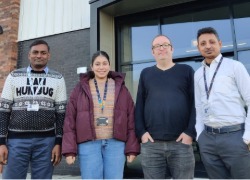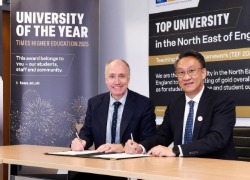Funding boost for Teesside University spin out company
An innovative project by a Teesside University start-up business to extract high value chemicals from algae, plants and microorganisms has been given financial backing.
The company is also developing links with the National Biologics Manufacturing Centre, which is under development adjacent to Teesside University’s campus in Darlington and also gave three best Bioprocessing poster awards for BSc (Hons) Biological Sciences students and also providing summer placements to get industrial experience.
TeeGene Biotech Ltd, which is based at Teesside business and science park at the Wilton Centre, has been given an innovation grant by the Biotechnology and Biological Sciences Research Council (BBSRC) Network as well as support from the Bio Base Europe Pilot Plant to test and develop its processes.
BBSRC is the largest UK public funder of non-medical bioscience and invests in world-class bioscience research and training on behalf of the UK public. It aims to further scientific knowledge, to promote economic growth, wealth and job creation and to improve quality of life in the UK and beyond.
The BBSRC grant will enable TeeGene Biotech to undertake a project to explore the use of naturally occurring microorganisms, microalgae, in the treatment of industrial waste water as well as their potential as a high value chemical ingredient.
Among the various bioactive compounds produced by algae, biosurfactant and bioemulsifiers are attracting major interest to make consumer products and find applications in various industries including food, cosmetics and antimicrobials.
Due to market demand for alternatives to synthetic surfactants and emulsifiers, the production of polysaccharides with surface active properties is attracting the attention of industrial biotechnology-focused European bio-economy initiatives. They are highly biodegradable and have low toxicity. There is also an abundance of raw materials in nature for the production of these molecules and they are highly biocompatible.
The biosurfactant market in Europe is already worth £511m and is expected to grow to £1.35bn by 2030. Algal biosurfactants are still represent a major untapped and unexplored area of research. They are gaining a lot of attention in relation to potential bioemulsifier properties in food and bio-therapeutic sector.
Dr Pattanathu Rahman, Director of TeeGene Biotech, said: 'Microalgae are a promising source of biofuel and high value chemicals and nutraceuticals.
'However, there are major technological challenges limiting the extent to which microalgae can be used in this way which the BBSRC funding will enable us to explore them further and try to overcome any obstacles.'
TeeGene Biotech was established to utilise its expertise in bioremediation and waste water treatment and to commercialise biotechnology based on bioreactors and bio-product development.
In February this year, the start-up was named as a runner up in the ‘Innovation in Bio-Based Product Development’ category at the Industrial Biotechnology Leadership Forum (IBLF) awards held in London.
The additional backing by the Bio Base Europe Pilot Plant provides TeeGene with the ability to assess the feasibility of its biosurfactant processes using specialist facilities in Ghent, Belgium.
Dr Rahman added: 'This funding is an excellent outcome and the work proposed in this project will pump-prime one of the arms of TeeGene’s business model, the development of integrated biorefinery technology based on organic waste streams.'
In 2014 Teegene Biotech took part in the icreate entrepreneurs’ initiative, a scheme backed by the Wilton Centre and the UK-wide BEST network of science and innovation parks and set up to help participants to become investment ready.
 Groundbreaking project to unlock nuclear energy's role in
...
Groundbreaking project to unlock nuclear energy's role in
... Start the new year by expanding your knowledge
Start the new year by expanding your knowledge  Teesside University strengthens long-standing partnership
...
Teesside University strengthens long-standing partnership
...